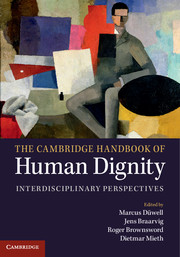Book contents
- Frontmatter
- Contents
- List of contributors
- Foreword
- Why a handbook on human dignity?
- Acknowledgments
- 1 Human dignity from a legal perspective
- 2 Human dignity: concepts, discussions, philosophical perspectives
- Part I Origins of the concept in European history
- 3 Meritocratic and civic dignity in Greco-Roman antiquity
- 4 Human dignity in the Middle Ages (twelfth to fourteenth century)
- 5 Human dignity in late-medieval spiritual and political conflicts
- 6 Human dignity in Renaissance humanism
- 7 The Council of Valladolid (1550–1551): a European disputation about the human dignity of indigenous peoples of the Americas
- 8 Martin Luther's conception of human dignity
- 9 Natural rights versus human dignity: two conflicting traditions
- 10 Rousseau and human dignity
- 11 Human dignity and socialism
- 12 Human dignity in the Jewish tradition
- Part II Beyond the scope of the European tradition
- Part III Systematic conceptualization
- Part IV Legal implementation
- Part V Conflicts and violence
- Part VI Contexts of justice
- Part VII Biology and bioethics
- Appendix 1 Further reading
- Appendix 2 Universal Declaration of Human Rights
- Index
- References
6 - Human dignity in Renaissance humanism
from Part I - Origins of the concept in European history
Published online by Cambridge University Press: 05 March 2015
- Frontmatter
- Contents
- List of contributors
- Foreword
- Why a handbook on human dignity?
- Acknowledgments
- 1 Human dignity from a legal perspective
- 2 Human dignity: concepts, discussions, philosophical perspectives
- Part I Origins of the concept in European history
- 3 Meritocratic and civic dignity in Greco-Roman antiquity
- 4 Human dignity in the Middle Ages (twelfth to fourteenth century)
- 5 Human dignity in late-medieval spiritual and political conflicts
- 6 Human dignity in Renaissance humanism
- 7 The Council of Valladolid (1550–1551): a European disputation about the human dignity of indigenous peoples of the Americas
- 8 Martin Luther's conception of human dignity
- 9 Natural rights versus human dignity: two conflicting traditions
- 10 Rousseau and human dignity
- 11 Human dignity and socialism
- 12 Human dignity in the Jewish tradition
- Part II Beyond the scope of the European tradition
- Part III Systematic conceptualization
- Part IV Legal implementation
- Part V Conflicts and violence
- Part VI Contexts of justice
- Part VII Biology and bioethics
- Appendix 1 Further reading
- Appendix 2 Universal Declaration of Human Rights
- Index
- References
Summary
Renaissance humanism
As a topic worthy of sustained and systematic scrutiny, human dignity first appeared on the philosophical agenda in the Renaissance. An indication of this is the appearance, from the middle of the fifteenth century onwards, of several tracts about the dignity and excellence of man. Yet, in spite of this apparently straightforward state of affairs, the Renaissance treatment of human dignity has also given rise to confusion. The reason for this is that we tend to read our own conceptions of human dignity into Renaissance discussions of it. Moreover, the new interest in human dignity in the fifteenth century is related to the revival of classical culture known as ‘Renaissance humanism’. The tendency to conflate this movement with later systems that have been labelled ‘humanism’, too, has been pervasive since the middle of the nineteenth century. In order to clear the ground, I must first disentangle the different meanings of the elastic notion of humanism.
The word ‘Humanismus’ was coined in 1808 by the German theologian and pedagogue, Friedrich Niethammer, to denote the educational current that laid much store by the study of the classical languages and literature (Niethammer 1808). In the course of the nineteenth century, however, the word came to be applied to a variety of currents, positions and worldviews. Particularly influential was Georg Voigt's use of the term to label the Renaissance programme of restoring ancient learning (Voigt 1859). Though the Renaissance scholars and thinkers who brought this movement about did not call themselves ‘humanists’, the label caught on. Since that time, ‘Renaissance humanism’ refers to the educational and cultural project to re-establish the liberal arts or studia humanitatis of antiquity, the pursuit of which was considered to be the privilege of free persons (as distinct from slaves). But, apart from this well-defined acceptation, ‘humanism’ acquired a wide range of other (sometimes conflicting) meanings. Here is a suitably loose description that attempts to cover some of their common features: ‘Humanism is also [i.e. in addition to being the designation for the cultural movement of the Renaissance] any philosophy which recognizes the value or dignity of man and makes him the measure of all things or somehow takes human nature, its limits, or its interests as its theme.’ Since such features have also been perceived in the culture of the Renaissance, the different meanings have blurred.
- Type
- Chapter
- Information
- The Cambridge Handbook of Human DignityInterdisciplinary Perspectives, pp. 85 - 94Publisher: Cambridge University PressPrint publication year: 2014
References
- 4
- Cited by



